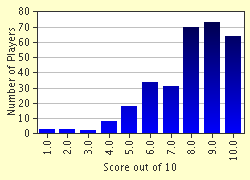Quiz Answer Key and Fun Facts
1. Thyrotoxicosis is a disease which can be caused by the over stimulation of the thyroid gland.
2. Which hormones are measured when a thyroid blood test has been requested?
3. What is block and replace regimen?
4. What is the commonest form of hyperthyroidism?
5. In which group of people are most cases of hyperthyroidism seen?
6. What is T.E.D?
7. What is the body not producing enough of to cause hypothyroidism?
8. Where in the body is the thyroid gland located?
9. Which of these are three of the medical options available to a patient with hyperthyroidism?
10. What kind of doctor would you see to treat a thyroid problem?
Source: Author
niecsey
This quiz was reviewed by FunTrivia editor
crisw before going online.
Any errors found in FunTrivia content are routinely corrected through our feedback system.


